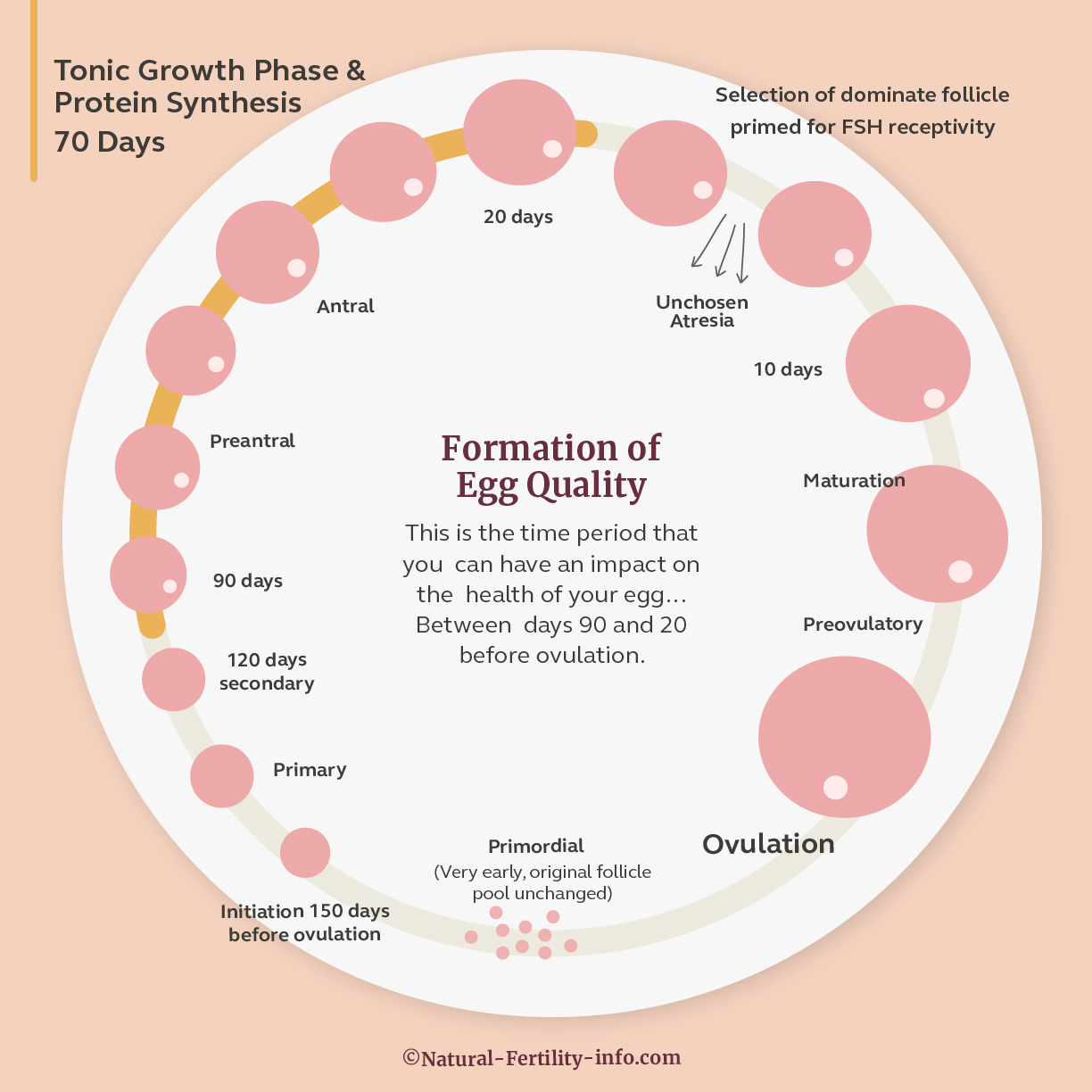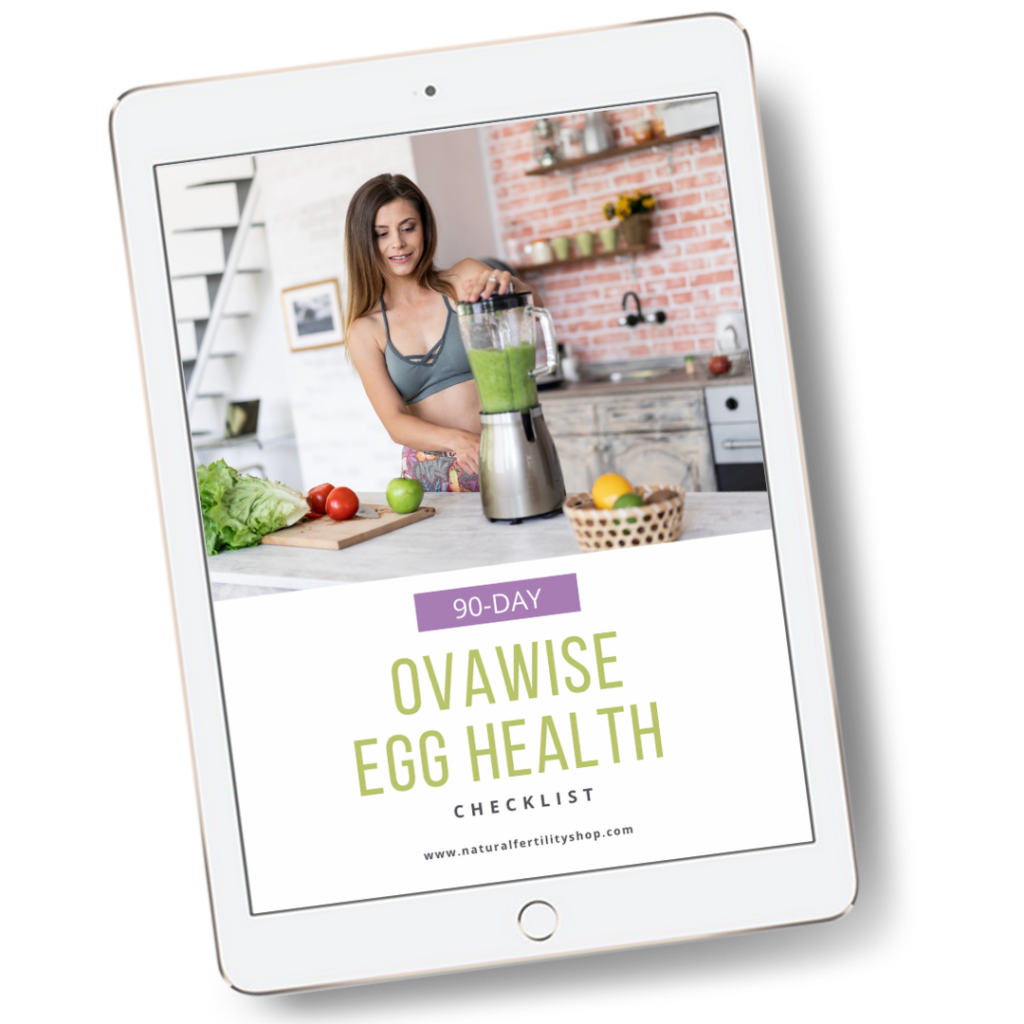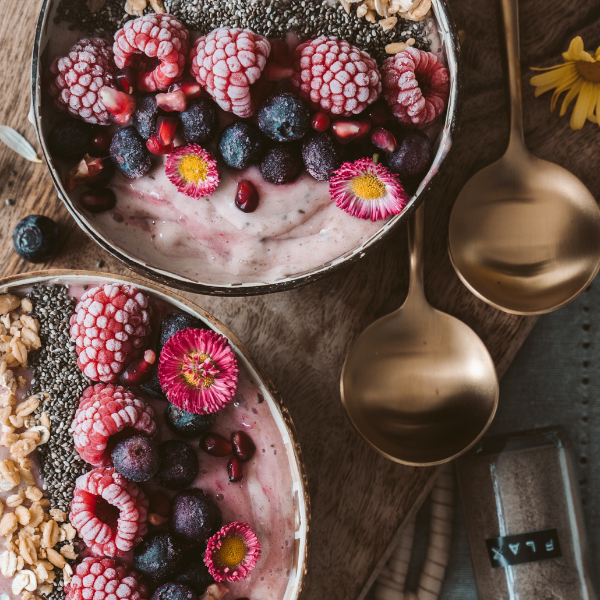In the past, a common belief was that the only factor which determines ovarian and egg health was age. Based on new studies, we now know that this may not be true.
There are many factors that can have an impact on the health of the ovaries and eggs including environmental factors, hormones in the diet, and stress, just to name a few.
In addition, having healthy fertility is based on many additional aspects to consider, including:
- Proper circulation
- A healthy fertility cycle
- Balanced hormones
- Healthy eggs
Why Is Egg Health Important?
Egg health is one of the cornerstones of healthy fertility. The health of your eggs (ova) can affect whether or not fertilization and implantation will occur as well as the viability of a pregnancy.
Age has an impact on egg health as the ovaries continued to age, causing the “housing” for the eggs as well as the environment in the body affecting egg cell health.
Protecting the eggs you currently have as well as encouraging ovarian health through diet, herbs, supplements, and increased circulation to the reproductive system is of the utmost importance.
90 Days: The Cycle of an Egg
Many women who are having trouble getting pregnant have been told by their doctors that their eggs are not healthy, or that their eggs are “old”. The options usually given to these women include using an egg donor, IVF, or adoption.
But what most women don’t know is that there are things you can do to help support the health of the ovaries and eggs, but it must be done for at least 90 days to have an impact.
During the cycle of an egg’s journey towards ovulation, there is a window of opportunity, a period of time, when certain factors can affect the health of the eggs that are preparing for ovulation.
The cycle of an egg in preparation for ovulation is around 90 days.

During this 90-day period before an egg reaches full maturation, the eggs are changing and preparing for ovulation. At this time, they are affected by both healthy or unhealthy influences.
Contributing factors to egg health are:
- Blood Flow
- Proper oxygenation
- Hormonal Balance
- Nutritional intake
- Stress
These are the factors I will cover in detail to help you optimize the health of your eggs. Let’s look at each factor closer and examine how you can have an impact on that area…
Blood Flow and Proper Oxygenation
Oxygen-rich blood flow to the ovaries is essential for good egg health. Researcher Jonathan Van Blerkom of the Department of Molecular, Cellular and Developmental Biology at the University of Colorado Boulder examined several studies to conclude that “Findings from several studies indicate that embryos with the highest implantation potential originate from follicles that are well-vascularized and oxygenated.”
Blood flow can decrease from lack of exercise, sitting all day, dehydration, and thick blood.
To increase blood flow to the ovaries, follow these suggestions:
Get at least 8 8oz. glasses of pure water every day
Dehydration can cause your blood to become thick and decrease circulation in the body, as well as many other issues. Make sure to drink purified water that is NOT bottled in plastic. An easy way to get a head start every morning, is to put a quart of water next to your bed when you go to sleep. You can then drink a quart of water upon rising and you are half way done with your water intake for the day.
Exercise
Find something to do that includes movement, such as tennis, walking, running, dancing, or fertility yoga. Exercise increases the blood flow in the body, brings fresh blood to all of the cells, and helps to oxygenate the blood.
Sit Less
Sitting throughout the day is a modern habit that is really affecting our health. We sit when driving to work, at work, and after we get home, we sit down to relax and watch TV.
Sitting compresses the reproductive system, slows circulation and lowers our breathing capability, decreasing oxygen in our blood.
Go for more walks, change positions while working and try to stand instead of sit when you can.
Womb Care Castor Oil Packs
One of my favorite ways to increase circulation to the reproductive system is through Womb Care Castor Oil Packs.
One of castor oils many benefits is to increase circulation to the area it is applied. When placed over the lower abdomen it increases circulation to the ovaries (where the eggs are hanging out), the fallopian tubes and uterus.
Womb Care Castor Oil Packs are also beneficial for supporting detoxification and reducing inflammation. All beneficial while supporting egg health and preparing for pregnancy.
Get Abdominal or Fertility Massage
One of the best therapies for increasing blood flow to the reproductive system is by massaging your uterus and ovaries. Massage helps to bring fresh, oxygenated blood to the ovaries and removes old stagnant blood.
You can learn how to apply Self Fertility Massage™ and do it in the comfort of your own home. It is best done starting the day after your period has ended and continued all month long, practicing at least 4 times a week.
If you are currently trying to conceive, perform the massage techniques from the day after your period has ended up until ovulation.
Learn more about Hethir Rodriguez’s Self Fertility Massage™ Program
Hormonal Balance
Hormonal balance is essential for proper egg health. Due to environmental factors, stress, and modern diets, more and more women are becoming hormonally imbalanced. If hormonal balance is off, the eggs may not respond, the fertility cycle gets out of balance, and ovulation may not occur.
An intricate hormonal symphony is at play every month in preparation and fulfillment of the fertility cycle. But there is good news; balancing your hormones is possible.
Here are some ways to help balance your hormones and nourish the endocrine system.
- Cleanse the system of excess hormones
- Use the fertility Superfoods Maca & Royal Jelly
- Reduce exposure to xenohormones
- If your FSH levels are high, the herb Vitex has been shown to help support normal hormone levels
Nutrition
During this window of opportunity, what you are eating can also impact the health of your ovaries and eggs either positively or negatively. It’s up to you. The types of nutrients your eggs depend on are found in a diet dense in nutrition. Check out the Nutrient Dense Fertility Diet for a complete guide about eating for fertility and egg health.
Here are some quick food suggestions for supporting egg health:
Top foods for egg health
- Pumpkin seeds
- Sesame seeds
- Turmeric
- Ginger
- FertiliGreens
- Broccoli
- Berries
- Dark Leafy Greens
Dietary and lifestyle habits that may damage egg health
- Cigarettes
- Caffeine
- Alcohol
- Sugar
- Non-organic meats and dairySoda
- Low fat diet
- Processed Foods
- Trans Fats

Get The Egg Health 90 Day Checklist
Learn which steps to take to help support your egg health in this easy to follow checklist and email series.
- Learn how to support egg health
- Get a checklist of all the steps to take for the biggest impact
- Begin to incorporate antioxidants for egg health and fertility
- And so much more…
Supplements
Antioxidants
Antioxidants are one of the most important components to having healthy fertility that every woman needs to focus on, especially if you are wanting to support your egg health.
Antioxidants help to protect the eggs from free radical damage. Free radicals are able to damage cellular health including the cell’s DNA, this could have an effect on the ability to get pregnant, sustain a healthy pregnancy and may increase the chances of possible birth defects. The ovum (egg) is one of the longest living cells in your body; as the years pass your eggs become exposed and vulnerable to free radicals on a daily basis. This adds up.
I formulated Fertilica OvaWise Antioxidants to help you get the most important antioxidants for fertility, daily. This blend is great for both men and women and should be a part of everyone’s health program, especially for egg health.
Coenzyme Q10 (CoQ10)
In addition to taking an antioxidant supplement blend, studies have shown that CoQ10 Ubiquinol supplementation improves egg health and fertilization rates, especially in women over 35.
In the journal Fertility and Sterility, Reproductive Endocrinology & Infertility Specialist Dr. Yaakov Bentoz, along with fellow researchers, has published research explaining the importance of supplementing antioxidants and “mitochondrial nutrients” like CoQ10.
In summary, they share what we know to be true, that oocytes form in each female ovary when she is a fetus in her mother’s womb. These oocytes remain her entire fertile life – some will grow to be ovulated, others will not – all of them being exposed to free-radicals and aging as the woman ages.
Bentov et al., share that “Aging and age-related pathologies are frequently associated with loss of mitochondrial function mainly due to the accumulation of mtDNA [mitochondrial DNA] mutations and deletions.”
As the cells age, they have less energy and oxidative stress causes them to lose their ability to function properly. This results in increased risk for mtDNA mutations, in turn increasing risk for miscarriage, or children being born with birth defects (the various forms of aneuploidy and trisomies are examples). As a result, Bentov et al. “… supplementing the diets of older women with mitochondrial nutrients may result in an improvement of oocyte and embryo quality, and subsequently, better pregnancy outcome.”
There are two forms of CoQ10 (coenzyme Q10), ubiquinone and Ubiquinol. CoQ10 starts off as ubiquinone and then is converted within the cell to the more powerful Ubiquinol.
As a woman ages, her body’s ability to convert ubiquinone to Ubiquinol declines. Most all CoQ10 supplements available are in the form of ubiquinone. Ubiquinol is different in that it is the most biologically active form of CoQ10 and does not need to be converted by the body.
Ubiquinol is eight times more potent than ubiquinone. For women over the age of 35, CoQ10 Ubiquinol supplementation alongside our antioxidant blend may greatly help to improve egg health over a few months’ time.
Fertility Superfoods
Fertility superfoods are nutrient-dense foods that help to nourish the body with vitamins, minerals and antioxidants. One of my favorite ways to take fertility superfoods is to put them in fertility smoothies.
Maca
Maca is an incredible fertility super food. It helps to balance the hormones, but does not contain any hormones itself. It is able to do this by nourishing and balancing the endocrine system. This is essential in preparing for pregnancy and IVF because healthy hormonal balance greatly contributes to healthier eggs.
Royal Jelly
Royal Jelly is a fertility superfood which may help to increase egg quality and quantity. Royal Jelly is the food that only the queen bee eats. What makes a queen bee the queen is eating royal jelly exclusively. She was an ordinary bee and then she was chosen and fed royal jelly and became the queen bee who lays up to 2000 eggs a day. It should be taken for at least three months before natural conception or IVF procedures begin.
Royal jelly is the Queen bee’s equivalent of hormonal stimulation. Take daily for best results. Caution: If you are allergic or think you are allergic to bees or bee products, do not take royal jelly.
FertiliGreens
FertiliGreens offers a nutrient-dense powder designed to enhance your daily nutrition. This premium blend includes an array of leafy greens, green superfoods, wild berries, and fruits, making it one of the most nutrient-rich and antioxidant-packed whole food supplements available.
Crafted exclusively from 100% whole foods without any synthetic vitamins, FertiliGreens is safe for daily consumption, supporting your nutritional needs while trying to conceive, throughout pregnancy, and during breastfeeding.
Stress
We live in a fast-paced world, and being a woman today has many blessings, one of them being a professional life, but are we constantly trying to hurry up and rush things in order to meet all of our commitments?
Reproductive Endocrinologist Dr. Allen Morgan and Fertility Specialist Dr. Douglas Rabin discovered that “stress also has a detrimental impact on fertility. Women who are constantly under stress produce prolactin, cortisol, and other hormones, which can interfere with or even block regular ovulation.”
The types of stress they are talking about range from traumatic, to less cataclysmic but still upsetting situations, such as an ongoing conflict at work.
So, if you are trying to improve your egg health, reducing your stress levels should be a major focus in your life. How can this be achieved? Well, first it needs to become a priority. Book some quiet time in your calendar for yourself. During your “quiet time” you could:
- Go for a walk
- Take a bubble bath (my favorite)
- Cuddle up with a good book
- Get a professional massage or reflexology treatment
- Drink some relaxing herbal tea, such as chamomile, kava kava, or peppermint
- Practice meditation
- Go to therapy/psychotherapy
- See an NLP (Neuro-linguistic Programming) coach
The results of an influential randomized, controlled trial by Professor Sarah L. Berga of the Department of Gynecology and Obstetrics, Emory University, Atlanta, Georgia, concluded,
“A staggering 80% of the women who received CBT [Cognitive Behavior Therapy] started to ovulate again, as opposed to only 25% of those randomised to observation”
Supporting egg health is important for every woman who is preparing for conception, especially as we get older. There are many things you can do to help support and protect your egg health, but they must done consistently on a daily basis for at least 90 days to have the best effect.

Get The Egg Health 90 Day Checklist
Learn which steps to take to help support your egg health in this easy to follow checklist and email series.
- Learn how to support egg health
- Get a checklist of all the steps to take for the biggest impact
- Begin to incorporate antioxidants for egg health and fertility
- And so much more…
Here is a quick summary of how to support and protect egg health:
1. Increase circulation to the reproductive system.
2. Encourage hormone balance.
3. Eat a nutrient dense diet and use supporting supplements.
4. Create a ‘stress support system’ to help you reduce stress.
- Levitas E, Parmet A, Lunenfeld E, Bentov Y, Burstein E, Friger M, Potashnik G. (2006). Impact of hypnosis during embryo transfer on the outcome of in vitro fertilization embryo transfer: a case control study. Fertility and Sterility, 85(5): 14048. Retrieved from: http://www.ncbi.nlm.nih.gov/pubmed/16566936
- Paulus, W.E., Zhang, M., Strehler, E., ElDanasouri, I., Sterzik, K., (2002). Influence of acupuncture on the pregnancy rate in patients who undergo assisted reproduction therapy. Fertility and Sterility. Vol 77, No 4. doi:10.1016/S00150282(01)032733. Retrieved from: https://www.fertstert.org/article/S0015-0282(01)03273-3/fulltext
- Bartosh, A. (2006, October 11). Research Results: CBT RESTORES OVULATION IN 80% OF INFERTILE WOMEN. Retrieved from https://beckinstitute.org/research-results-cbt-restores-ovulation-in-80-of-infertile-women/
- Powell, A. (2005) Harvard, MGH researchers track egg cell production to marrow. Researchers restore egg production in sterile mice. Harvard University Gazette. Retrieved from: https://news.harvard.edu/gazette/story/2005/08/harvard-mgh-researchers-track-egg-cell-production-to-marrow-2/.
- Gougeon, A. (1986). Dynamics of follicular growth in the human: a model from preliminary results. HumanReproduction. 1(2):817. Retrieved from: http://www.ncbi.nlm.nih.gov/pubmed/3558758.
- Meissner, H.O., Kapczyski, W., Mcisz, A., Lutomski, J. (2003). Use of Gelatinized Maca (Lepidium peruvianum) in Early Postmenopausal Women. International Journal of Biomedical Science. 1(1): 33–45. Retrieved from:http://www.ncbi.nlm.nih.gov/pmc/articles/PMC3614576/.
- Muller V. (1997) Maca in Hormone Replacement Therapy. Whole World Botanicals Report.; 17.
- Muller V. (2002). South American Herb Maca as Alternative to Hormone Replacement Therapy. Whole World Botanicals Report; 11. Retrieved from: http://kokming.com/smsmaca/MacaasAlternativetoHormoneReplacementTherapy.htm
- Walker M. (1998) Effect of Peruvian Maca on Hormonal Functions. Townsend Letter for Doctors and Patients.; 11:18. Retrieved from:https://wholeworldbotanicals.com/effects-of-peruvian-maca-on-hormonal-functions/
- White YA, Woods DC, Takai Y, Ishihara O, Seki H, Tilly JL. (2012, Feb. 26). Oocyte formation by mitotically active germ cells purified from ovaries of reproductive-age women. Nat Med. 18(3):413-21. doi: 10.1038/nm.2669. Retrieved from: https://www.ncbi.nlm.nih.gov/pubmed/22366948
- Bentov, Y., Esfandiari, N., Burstein, E., Casper, R.F. (Jan. 1, 2010). The use of mitochondrial nutrients to improve the outcome of infertility treatment in older patients. Fertility and Sterility, Volume 93, Issue 1, Pages 272–275, Retrieved from: https://www.fertstert.org/article/S0015-0282(09)02484-4/fulltext
- Van Blekrom, J. (Mary 1998). Epigenetic Influences on Oocyte Developmental Competence: Perifollicular Vascularity and Intrafollicular Oxygen. Journal of Assisted Reproduction and Genetics. Volume 15, Issue 5, pp 226–234. Retrieved from: https://link.springer.com/article/10.1023/A:1022523906655
- Westphal LM, Polan ML, Trant AS, Mooney SB. (2004) A Nutritional Supplement for Improving Fertility In Women. J Reprod Med. Apr; 49(4):28993. Retrieved from: https://www.ncbi.nlm.nih.gov/pubmed/15134155
- Packer, L., & Colman, C. (2001). The antioxidant miracle: Your complete plan for total health and healing. New York: Wiley.
- Bowden, J. (2017). The 150 healthiest foods on earth: The surprising, unbiased truth about what you should eat and why. Beverly, MA: Fair Winds Press.
- Battaglia, C., Salvatori, M., Maxia, N., Petraglia, F., Facchinetti, F., and Volpe, A. (1999) Adjuvant Larginine treatment for invitro fertilization in poor responder patients. Hum. Reprod. (7): 16901697. doi:10.1093/humrep/14.7.1690. Retrieved from: http://humrep.oxfordjournals.org/content/14/7/1690.
- Is Stress Keeping You Infertile? Could stress be to blame for your baby-making struggles?. (n.d.) Hudson Valley Parent. Retrieved from: https://hvparent.com/is-stress-keeping-you-infertile





